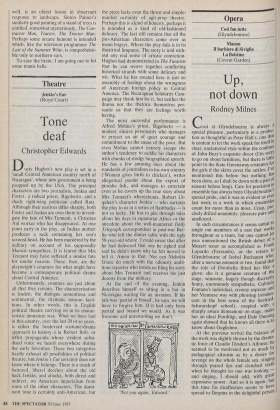Theatre
Jenkin's Ear (Royal Court)
Tone deaf
Christopher Edwards
D usty Hughes's new play is set in a `small Central American country north of Nicaragua', whose new government is being propped up by the USA. The principal characters are two journalists, Jenkin and Foster, a radical priest, Rigoberto, and a shady right-wing politician called Ruiz. Although their motives differ sharply, both Foster and Jenkin are over there to investi- gate the fate of Mrs Tennant, a Christian Aid worker who has disappeared. At one point early in the play, an Indian mother produces a sack containing her son's severed head. He has been murdered by the military on account of his supposedly Marxist sympathies. It is feared that Mrs Tennant may have suffered a similar fate for similar reasons. These, then, are the playwright's counters for what might have become a contemporary political drama about Central America.
Unfortunately, counters are just about all that they remain. The characterisation is leaden, the dialogue sententious and sentimental, the dramatic tension facti- tious. In other words, this is English political theatre carrying on in its charac- teristic immature way. What we have had in this country, over the last 20 or so years, is either the boulevard costume-drama approach to history a la Robert Bolt, or leftist propaganda whose strident subsi- dised voice we heard everywhere during the early Seventies. These two categories hardly exhaust all possibilities of political theatre, but Jenkin's Ear certainly does not know where it belongs. There is a touch of battered, liberal decency about the old hack Jenkin, and attacks, both direct and indirect, on American imperialism from some of the other characters. The domi- nant tone is certainly anti-American, but the piece lacks even the thrust and simple- minded certainty of agit-prop theatre. Perhaps this is a kind of honesty, perhaps it is intended as a kind of old-fashioned delicacy. The fact still remains that all the pro-American characters come over as mean bogeys. Where the play fails is in its theatrical limpness. The story is told with- out any real sense of artistic conviction. Hughes had demonstrated in The Futurists that he can weave together conflicting historical strands with some delicacy and wit. What he has created here is just an assembly of feelings about the wrongness of American foreign policy in Central America. The Nicaraguan Solidarity Cam- paign may thank him for it, but neither the drama nor the rhetoric themselves per- suade us that they are feelings worth having.
The most successful performance is Alfred Molina's priest, Rigoberto — a modest, elusive personality who manages to project an air of quiet courage and commitment to the cause of the poor. But even Molina cannot entirely escape the author's tendency to saddle his characters with chunks of stodgy biographical speech. He has a few amusing lines about the standards of journalism in his own country (Woman gives birth to chicken'), writes allegorical poems about the export of piranha fish, and manages to entertain even as he covers up the true story about Mrs Tennant's whereabouts. Robert Ur- quhart's character Jenkin — who narrates the play to us in a series of flashbacks — is not so lucky. He has to pile through tales about his days in equatorial Africa or the anecdote about the well-mannered Daily Telegraph correspondent in post-war Ber- lin who left the dinner table with the ugly 50-year-old whore. I could swear that after he had delivered that one he sighed and said he didn't know why he felt moved to tell it. Amen to that. Nor can Nicholas Grace do much with the odiously ambi- tious reporter who insists on filing his story about Mrs Tennant and receives his just deserts from the military.
At the end of the evening, Jenkin describes himself as sitting in a bar in Nicaragua waiting for an invasion. If his tale was 'partial or biased', he says, we will have to forgive him. If it had only been partial and biased we would. As it was tiresome and unrewarding we don't.
'Not you again, Edward.'


























































 Previous page
Previous page